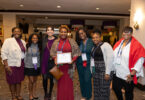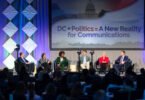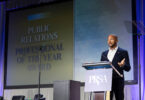Google “environmental conservation,” and the search results run into the millions.
Like the countless individuals, organizations and causes that fill those pages, PRSA — with the support of its board of directors — has been working to minimize the environmental impact of its operations. Our efforts are a vital concern for PRSA Members, who want to be part of an organization that does its part for the world we share.
The 39th anniversary of Earth Day is a perfect opportunity to reflect on some of our conservation efforts at PRSA. Our initiatives are both large and small, understanding that even small measures will add up over time.
Paper. Until we achieve the elusive “paperless society,” PRSA is rethinking the way it buys and uses paper. We’ve eliminated paper completely in some cases; for example, we removed approximately 75,000 lbs. of paper from the consumer waste stream annually by migrating our “One Source” directory online. We’re also now disseminating meeting materials electronically, providing more information online, using lighter-weight paper stock and reducing the physical size and page count of certain printed materials. Our latest Silver and Bronze Anvil “calls for entry” are great examples of the latter.
Recycling. PRSA’s offices are located in a multi-tenant building that undertakes various conservation measures. Among them, it separates paper and other recyclable materials from the trash and sends them to a local recycling center for processing.
Water. The Container Recycling Institute reports that 86 percent of plastic water bottles used in the United States become garbage or litter. Incinerating the used bottles produces toxic byproducts, and plastic water bottles in landfills can take up to 1,000 years to biodegrade.
PRSA has stopped offering bottled water at its on-site meetings, conferences and professional development sessions. The office water cooler also has been replaced with a “bottleless” system that connects directly to our cold water supply via a purification system. We do maintain a small inventory of bottled water, but only for the rare occasion it’s more practical.
Office Materials. Whenever practical, PRSA donates re-usable materials to appropriate causes. Last year, more than 800 binders from Silver Anvil Award entries were reclaimed and given to MS326 in Harlem, a “Title One” school where more than 90 percent of the study body lives below the poverty line. The school is using the binders for both student projects and to organize administrative paperwork.
MS326 also was the recipient of hundreds of plush toys — promotional items leftover by a Conference speaker — which PRSA staff members volunteered to package and deliver. Having little opportunity to give to others during the holiday season, the seventh- and eighth-grade students took the toys to an elementary school in their neighborhood; there, they performed a skit created for especially the occasion, before passing out the toys to the first- and second-grade classes.
Computer Equipment. PRSA participates in a trade-in and recycling program, in which certain used computer products are either re-purchased at a predetermined value, or broken down into raw materials that are used to create new equipment. The goal of the program is to re-use or recycle all materials, so that zero waste is sent to landfills.
“Green” Partners. PRSA also looks for environmental commitments from its vendors and partners. PRSA’s most significant vendor relationship is with Marriot International, which joined forces in 2007 with Clean Up the World, a global environmental organization with 35 million volunteers in 120 countries. Marriott also has undertaken extensive “green” initiatives covering everything from its use of fluorescent lighting to its laundry procedures and water consumption.
Being responsible environmental stewards not only helps our organization, it benefits the world we live in. Knowing that the environmental movement is here to stay, we’ll continue to look for opportunities to reduce the impact of our community on the world around us. If you’ve seen other groups undertaking environmental efforts that are worthy of PRSA’s consideration, I hope you’ll drop me a line.
William Murray is president and COO of PRSA.







Bill,
Thanks to you and your team for taking these measures to help conserve our resources for future generations.
I found this post very interesting. I wasn’t aware of the efforts PRSA had underway to help with environmental conservation. I especially liked donating Silver Anvil binders to a “Title One” school. That was a great idea.
Thanks Bill and team!
That’s a great list, team. Can we do more? Not lighter weight paper, but recycled paper for EVERYTHING and soy based inks, too And what about greening the annual meeting? It goes way beyond onsite recycling. Carbon offset reporting (and not just buying them but actually significantly reducing travel and reporting it on PRSA’s website?) How green is the office space there on Maiden Lane? Do you have a LEED for Commercial Interiors certification? Lowering your operating costs is found money. Are you working with the building management to push the building for LEED for Existing Building: Operations and Maintenance certification? And education? Do we have FTC guidelines on avoiding false environmental claims prominently on our website?
Just some random Sunday morning thoughts.
Hi Judith –
Thanks for writing – some very impressive thoughts you had for a Sunday morning! It has taken me a while to get back to you as I wanted to do some digging – and our board meeting intervened in the midst of our research here – but here’s what I can tell you.
Starting with the paper and ink, whenever possible we do use recycled paper and soy-based ink – something I should have mentioned in my blog post. For instance, PRSA letterhead and envelopes are created on recycled paper using soy-based ink – and Tactics is also printed on recycled paper using soy-based inks. We have been working with our printers so that all of our externally printed materials are or will soon be “green.” In some cases, we aren’t quite at the point where we can totally go that route. For example, our printers and copy machines do not use soy-based ink because the manufacturers do not offer a “green” solution, and these machines are only compatible with proprietary toner cartridges. Other PRSA office products are not “green” because the relative cost is between 20 to 146 percent higher than current costs, and our budgets currently cannot take on the additional expense. We’ll make more progress over time as we replace machinery and as the cost differentials shrink.
The building in which PRSA maintains its offices does not have a LEEDS certification. We’ve been told by our building manager that an independent consultant was retained to evaluate the building. The consultant estimated the LEEDS rating for this building would likely fall somewhere between a silver and platinum rating. However, the cost associated with LEEDS certification is very high and the building decided not to pursue it at this time. Since we are one of many tenants, with the landlord being the primary tenant, we do not have the ability to require LEEDS certification from the landlord, though we can urge them on.
You also made a great point about the FTC Guidelines for Complying with Environmental Marketing Guides. As you may know, we’re rebuilding our Web site, and one of the great new features we’re working on is making it easier to find important information like this.
Thanks again for the thoughts – and keep them coming!
Kind regards,
Bill Murray
Bravo, Bill.
btw, was in the office Saturday to judge the Batemans…the PRSA staff was totally buttoned up and attended to our every need. What a great bunch!
Ken